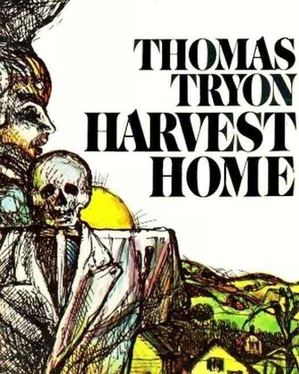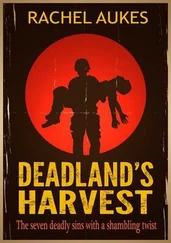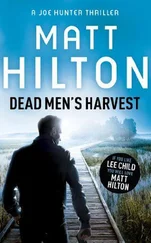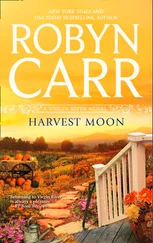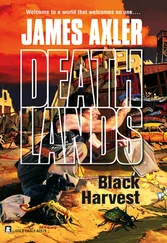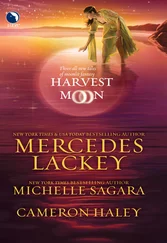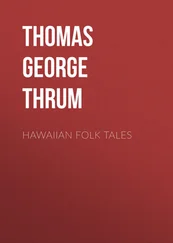There was something in the simple country way he put his words together that painted a picture for me. I could see the fallow fields, the drab sky, the melting snow, and the tempestuous, strange creature that was Gracie Everdeen, victim of unbridled passions, spurning the mother who broke her heart, the lover who betrayed her.
“But she didn’t come back to the village that spring, did she?” I was remembering Mrs. O’Byrne’s part of the story.
“No, sir, she didn’t. She was stayin’ over t’ Saxony, but she wouldn’t cross the river. Wouldn’t come over the Lost Whistle for hide nor hair.”
“Why not?”
He ducked his head briefly, and faltered in his story. Then, regaining himself, “Who knows? Womenfolk do peculiar things sometimes. Roger Penrose heard she was over there, and he rode out and begged her to come home. Time after time, but she wouldn’t.”
“Why wouldn’t Roger cross the bridge?”
“Wasn’t supposed to. It’s the rule. In the seventh year the Harvest Lord’s not to go beyond the village boundaries. Same for the Corn Maiden. But Grace, on her side, she’d never set foot to the bridge. And Roger’d never go to her.”
“But he did, finally.” I told him what I had learned from Mrs. O’Byrne about the night Roger had galloped across the river and carried her to the Cornwall side, and that Mrs. O’Byrne had wanted to fire Gracie for immorality.
Amys stared at me, speechless, then spat again. “‘Tain’t true! Roger never touched her that night!”
“How do you know?”
“I-” He stopped uncertainly, glanced quickly at Bert, the bartender, then hollered for more nuts. When Bert had gone to the far end of the bar, Amys continued in a hoarse whisper, “Roger never laid a finger to her. The Harvest Lord can’t have relations with no girl before Harvest Home. It’s against the ways. Anyhow, Roger met her just before the Corn Play. That was poor Gracie’s last chance. He rode back and Tamar was crowned in her place. Next day, the day before Kindlin’ Night, when they burn the scarecrows, the Widow Fortune buggies over to talk to Gracie. She come back without her, too. So Tamar goes to Harvest Home.”
“To do what?”
“Hell, son, don’t ask me all these questions. I’m tryin’ to tell you. Roger goes to Harvest Home as the Lord, and Tamar goes as his Maiden.”
“Goes where?”
“To the woods. To Soakes’s Lonesome.”
“Harvest Home is celebrated in the woods?”
“The seventh one is, always. But then, Gracie comes too.”
“And was a disruptive influence.”
“Who says?”
“The ladies. Mrs. Green, Mrs. Zalmon-”
“Damn old biddies. If she was, the Lord God he knows.”
“Then what happened?”
“Two days later, Irene Tatum finds her poor body in the river. Thrown herself off the Lost Whistle. I heard, and I went to toll thrice times thrice. But Mr. Deming comes and says I can’t. He tells me to dig a hole.”
“Outside the cemetery.”
“Mr. Buxley-he says he can’t read service for a suicide, and here come all the elders carryin’ a pine box, with Gracie inside, and they set it in the hole; then Mr. Deming in his black suit tells me to fill it in, and they go away. Not a soul there for the funeral. Mrs. Everdeen packs up and leaves town for the shame, and there’s the end of it.”
“You buried her?”
He turned his head quickly and used the spittoon again. After a moment he said, “Buried her beyond the fence, where you see her stone. Where she lies without, in disgrace, and Roger lies within, in honor. And herself runs the post office and makes fast and loose with anything in pants.” He clutched my sleeve and spoke fiercely. “Don’t you listen to folks. Gracie was a fine girl. And a beauty, don’t you forget. Pretty as spring, a reg’lar fairy, that was Grace.”
Bert came and collected the glasses, obliterating with his rag the wet rings left on the bar.
Amys tottered off his stool, a sad, forlorn look on his wrinkled face. “Listen to me, sir. I loved Grace, and I never forgot her, even though they’d like to. Sometimes when I ring thrice times thrice, like when Mrs. Mayberry died, I tell Gracie that’s for her.”
He touched his hat brim, thanked me for letting him wet his whistle, and took up his broom and left.
I finished my drink, trying to piece together the threads of his story of the unfortunate Gracie Everdeen, and chalked it up to a case of unrequited love.
When I approached the church again, Amys was tolling six o’clock. Above the bronzy notes of the bell, the voices of the choir sounded, floating out through the vestibule door and hanging soft in the air. The sun was dropping behind the post office, and long shadows had crept across the Common, making the circles on the grass more pronounced.
I took a few moments to step into the church and sit in one of the pews, looking up at the choir loft over the doors, where the girls held their sheets of music in pairs and sang the lovely melody. Maggie was at the organ, watching in the little mirror over the keyboard as Mrs. Buxley conducted the voices, while, in the upper corner of the loft, the Widow Fortune sat leaning her head on her hand, lost in some private reverie.
The song ended, and the church was perfectly still for a moment. Then the girls moved from their places, gathering around the old lady as she spoke to them, praising them for their singing. When I went up the aisle, I glimpsed Mr. Buxley seated at a table in the vestry, writing in a ledger. I stopped for a word, and he explained he was entering the date of old Mrs. Mayberry’s death. He brought down another, showing me the entry of her birth sixty-seven years before; then he returned both ledgers to the shelf. Each volume was dated by year, a whole history of village births and marriages and deaths, the three important events of a man’s life, no matter where he may live.
I complimented him on the music I had heard; he said yes, it would pass very nicely for Tithing Day.
I walked along Main Street, looking at the houses with their neat gardens and fences, their windows, some with as many as eighteen panes of glass apiece, the handsome Colonial doorways. The kinds of houses I had never known in the city.
Passing Tamar Penrose’s place, I saw the child Missy perched on the limb of an apple tree, playing with her doll while some chickens pecked in the dirt below. She lifted her head and stared at me as I walked by. Suddenly I thought of the other doll, the one from the cornfield, and was shocked to realize I didn’t know what had become of it. As I tried to recollect the circumstances, I heard her give a little cry. She had caught her dress getting out of the tree, and when she tried to free it she lost her hold and tumbled to the ground. I ran back and opened the gate. She lay at the base of the tree looking stunned. I knelt and lifted her head and asked if she was all right. She stared at me; then her two hands came up and pressed her temples, as though to relieve the pain.
She was wearing a strange-looking cap of knitted wool, pulled down around her ears as though it were the dead of winter. Her dress had grass stains on it, her shoes were muddy.
“Hello,” I said.
She regarded me emptily; then a look of recognition floated into her washed-out eyes.
“Missy, do you remember me?”
“Mnmm-mean, um-paint-”
“That’s right. I’m a painter. Do you remember at Agnes Fair, what happened with the sheep?”
She shook her head.
“You pointed at me, remember?”
Another shake. She was staring at a chicken that was scratching in the dirt around the tree.
“Did someone tell you to point at me?”
A shrug.
“Did someone tell you to pick the Harvest Lord? Or did you pick him because you like Worthy Pettinger?”
Читать дальше
